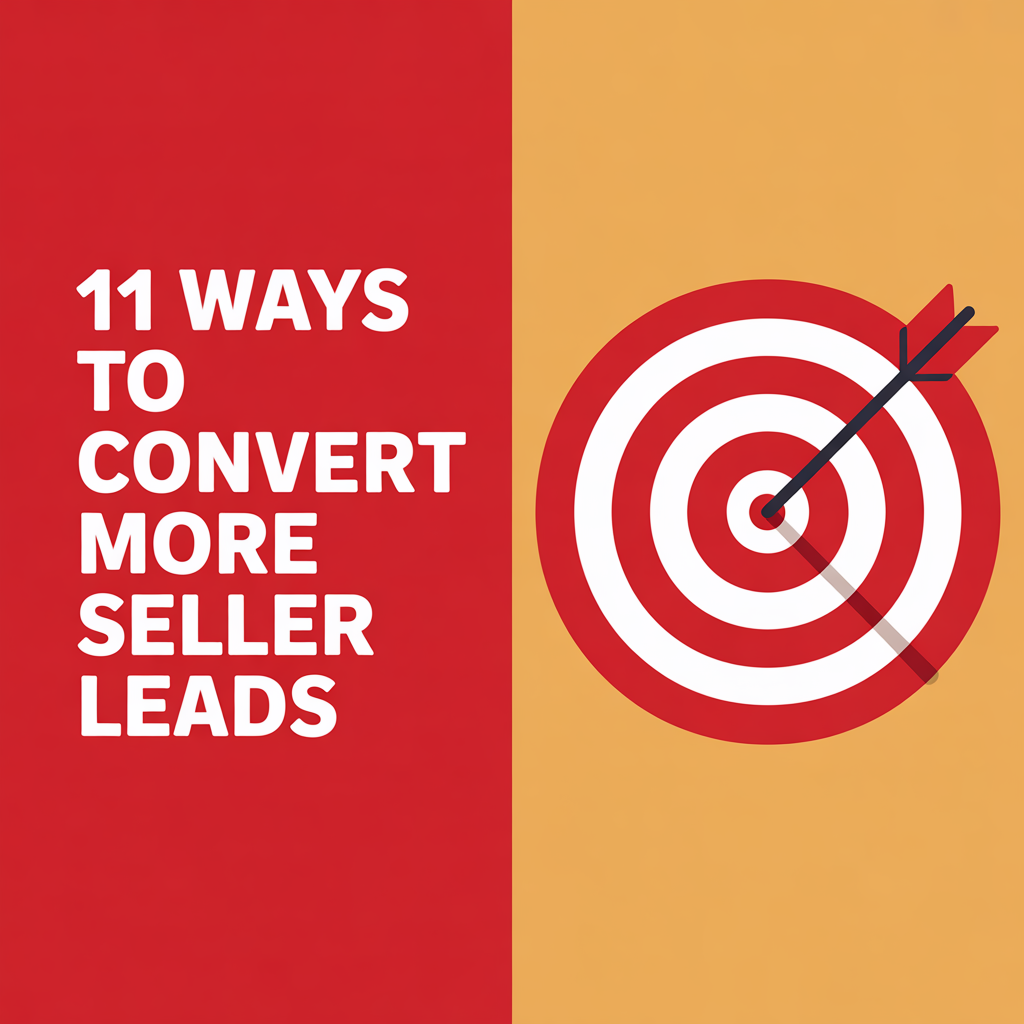In a shifting real estate market, smart investors aren’t just chasing leads—they're building systems that attract and convert the right kind of sellers. Micah Johnson from 80/20 REI knows this better than most. At the core of his business is a deep understanding of how to generate and follow up with motivated seller leads using a precision-based approach backed by real data.
Why Motivated Seller Leads are the Goldmine of Real Estate
Motivated seller leads are the lifeblood of successful real estate investing. These are homeowners who, for one reason or another, are ready to sell fast—often at a discount. Whether it’s foreclosure, divorce, debt, or death, these situations create urgency. Johnson emphasizes the importance of building a system that not only identifies these leads but follows up consistently until the deal is closed.
The Power of the 4 D's
Micah Johnson highlights the "Four D's" as the most common motivators for distressed sellers: Debt, Death, Divorce, and Dissolution. These life events often lead homeowners to seek fast solutions, making them prime candidates for motivated selling.
The 80/20 REI Approach: Born from Real Investor Needs
80/20 REI was founded by real estate investors who were struggling to make sense of disjointed marketing efforts. After realizing that data, when processed strategically, could act like a "treasure map" to find high-value prospects, they built a system from the ground up. Their model focuses on identifying people likely to sell at a discount within a specific timeframe, then helping clients contact those sellers with intention.
I Build Treasure Maps
Micah describes his work as "building treasure maps for real estate investors"—a vivid metaphor that reflects the strategic role data plays in helping investors uncover hidden opportunities.
Backed by Collective Genius (CG)
Micah and his team are part of the Collective Genius (CG) mastermind group, a well-known network of elite real estate investors. This affiliation underscores their credibility and their access to the nation’s top-performing peers.
Not Just Data – It’s What You Do With It
One of the most powerful takeaways from Micah’s discussion is a quote from his co-founder Jesus: "It’s not just the data, it’s what you do with it." That mindset forms the foundation of 80/20 REI’s success—data is only valuable if used intentionally.
Spray-and-Pray Is Dead: Welcome to Intentional Marketing
A common trap for investors is the "spray and pray" approach—blanket marketing with no strategy. Johnson criticizes this outdated method, advocating instead for tailored outreach over 180 days. Every motivated seller receives a carefully timed sequence of messages: cold calls, texts, and direct mail, all delivered at the right time, with the right message, on the right channel.
The Importance of Hitting at Least 8 Touches
Johnson emphasizes that unless you hit a seller at least 8 times, you’re relying on luck. Strategic persistence is essential to conversion.
Strategic Outreach: What the Blueprint Looks Like
Take pre-foreclosures, for example—the highest-weight category for discounted deals. Johnson recommends:
- Cold Calling: 3 times a day for the first 10 days, then once daily for the rest of the month.
- Text Messaging: Integrated early and strategically, with a limit of two aggressive texts per month.
- Direct Mail: Timed for when it will have the greatest emotional and financial impact.
Each lead gets nurtured across all channels with a purpose-built 180-day strategy. Investors receive monthly refreshed lists that are cleaned, curated, and optimized.
Red Dot Syndrome and Texting Limits
Texting is powerful but must be used sparingly. Johnson explains the "Red Dot Syndrome"—the idea that texts are always seen and should be sent with intention. He warns that more than two aggressive texts per month can harm your brand.
Most Aggressive Texting Should Be Twice Monthly
Johnson clarifies that the most aggressive SMS cadence should be no more than two times per month—a figure that surprises most investors.
Case Study - The 27th Touch Wins
Micah shares a success story where a seller in pre-foreclosure didn’t respond for 8 days. On the 27th touch—the ninth day, third call—they finally connected. That seller ended up closing. Without that follow-through, the deal would have been lost.
Sister Company Case Study - Miami Acquisition
Micah recalls how a sister company followed their cold calling blueprint on a pre-foreclosure lead. After three calls a day for 10 days, they secured the property on the 27th touch, proving the model's effectiveness.
Why Timing and Consistency Matter
Johnson's data shows that the winning touchpoint often comes late in the sequence. One case study revealed that on the 27th contact (after 8 days of silence), the seller finally responded—just as life circumstances aligned. Without that consistency, the opportunity would have been lost. That’s the real value of having a system: it removes luck from the equation.
Follow Up Until They’re Not Viable
Johnson suggests following up until a seller either sells, opts out, or becomes nonviable—not just when it’s convenient. This level of commitment is what separates the pros.
Treat Prospects Like Leads
Most investors treat prospects as lower priority than leads. Big mistake. Johnson argues for treating every prospect like a lead—with systems, tracking, and follow-up sequences. Doing this transforms your pipeline from a hope-driven mess to a machine engineered for conversions.
Solve Prospect Problems Like Lead Problems
Johnson makes the case that the same intensity and strategy applied to leads should be applied to prospects. Your pipeline should be engineered, not filled with hope.
Your Pipeline Shouldn’t Have Hope in It
Micah's memorable advice: “Your pipeline shouldn't have any hope in it.” Everything should be intentional, structured, and built for results.
Long-Term Follow-Up – Until They Sell or Say Stop
Investors often quit follow-up too soon. Johnson urges continued outreach until the seller either sells the home or explicitly opts out.
The Psychology of the Seller
Understanding your customer’s life situation is key. People in distress often don’t know their options. By offering clear, honest communication—not hype—you help them solve a real problem. That builds trust, gets deals done, and keeps your reputation clean.
Speak Plainly and Honestly
Johnson emphasizes that sellers in distress need simplicity and truth. Investors should use plain, compassionate language to build trust.
Recession = Opportunity
Micah believes we’re heading into a challenging market: rising unemployment, growing pre-foreclosures, and financial instability. But with challenge comes opportunity. Now is the time to lean in, not retreat. The best investors see downturns as moments to gain ground, not pause.
Micah's Personal Recession Story
Micah shares that he lost his job just one week before his wedding in 2008. That hardship sparked his understanding of financial pain—and his passion for helping others in crisis through real estate.
Redfin, Opendoor, and the Fall of iBuyers
Large iBuyers like Redfin and Opendoor are pulling back. Johnson sees this as a massive opportunity for local investors to take market share. The big guys don’t build relationships or solve human problems. That’s where ethical, intentional investors win.
Investors Are Problem Solvers, Not Just Buyers
Johnson sees local investors as critical problem-solvers for homeowners. By offering honest deals and fast closings, they provide real solutions—not just offers.
Common Investor Mistake: Not Following Up Long Enough
A key mistake Johnson sees? Stopping too early. Some companies close 75 deals a year but only make 6 touches per lead. That’s not enough. You should follow up until:
- The lead sells.
- They explicitly ask you to stop.
Because motivations evolve. Life happens. Staying top-of-mind wins.
Most Investors Spam Then Stop
Micah observes that many investors front-load their marketing—sending a flurry of texts or calls—and then abandon follow-up. This short-sightedness leads to missed opportunities.
No Plan Past Initial Contact
Many investors don’t plan beyond the first call or mailer. Johnson stresses that a long-term system is essential for converting leads consistently.
Budgeting Your Outreach: A Custom Plan
80/20 REI doesn't offer a one-size-fits-all approach. Some clients prefer cold calling; others like direct mail. Johnson's team helps set a consistent monthly strategy tailored to your budget and strengths:
- How many people should you text
- How many to call
- How many to mail
The goal? Make every marketing dollar work harder through focus and planning.
Onboarding Tailored to Strengths
80/20 REI’s onboarding process digs deep to uncover what marketing channels clients are best at. The strategy is then built around those core strengths to increase success.
Solving Data Pain Points
The company solves four common investor frustrations: not enough data, inconsistent outreach, lack of visibility ("data is in a black box"), and uncertainty in execution.
Managing Three Lists for Multichannel Campaigns
80/20 REI helps clients build consistent, multichannel campaigns across direct mail, cold calling, and SMS—all delivered with precision timing.
Micah Johnson: From Insurance to Real Estate
Johnson's background in insurance and medical sales gave him empathy and grit. But real estate gave him purpose. Starting in 2014, he joined a foreclosure team and never looked back. By 2020, he had canceled 33 deals in one day. Now he dedicates himself to helping other investors build smarter systems.
Book Recommendation – Thinking, Fast and Slow
Micah recommends the book Thinking, Fast and Slow by Daniel Kahneman. It's all about making intentional decisions—an approach that echoes throughout his business philosophy.
Final Advice: Be Intentional. Be Helpful
Every person you contact is a human first, lead second. Approach them with empathy, clarity, and strategy. That’s how you build a business that lasts—especially in uncertain times.
Most Important Key Takeaways
Follow-Up is Everything
You must follow up with prospects at least 8 times—ideally up to 27 or more—to close deals. Stopping early is the #1 mistake investors make.
Build a System, Not a Campaign
80/20 REI provides a 180-day, multi-touch outreach plan using cold calls, texts, and mail—targeting the right seller at the right time.
Pre-Foreclosure Leads Are Gold—but Competitive
Micah's team aggressively targets pre-foreclosures with tailored messaging and timing, proving that proper sequencing works even in tough lists.
Spray-and-Pray is Dead
Blanket outreach is wasteful. Intentional marketing wins. Every outreach should be based on data and a strategic timeline.
Texting Is Powerful—But Dangerous If Overused
The ideal maximum is two aggressive texts per month. Anything more risks hurting your brand.
Treat Prospects Like Active Leads
Most investors only nurture prospects lightly. Treating them with the same seriousness as leads turns pipelines from “hope” to performance.
Use Data Strategically, Not Blindly
It's not about having a list—it’s about what you do with it. Every investor should have a tailored plan built around their strengths.
Micah’s Success Proves It Works
Case studies show that deals have closed on the 27th touch. One sister company closed a Miami deal exactly this way using the system.
Recession = Opportunity
Job losses and pre-foreclosures are rising. Now is the time for ethical, local investors to step up and solve problems that big iBuyers won’t.
Be Human First, Investor Second
Motivated sellers often feel overwhelmed. Clear, honest, empathetic communication is more effective than flashy offers or pressure tactics.
Build Your Business the Smart Way
Don’t wait for the market to get easier. Build a real system now. Treat your prospects like people. Design your marketing like it matters. Visit 80/20 REI to claim your market and start generating more motivated seller leads with intention.






